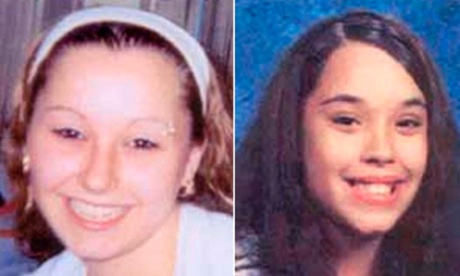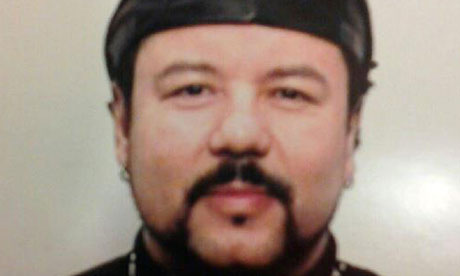Ohio abductions: end of decade of torment for victims and families
Neighbours had few suspicions Amanda Berry, Gina DeJesus and Michelle Knight were being held in Seymour Avenue
Ed Pilkington in Cleveland, Ohio
The Guardian, Wednesday 8 May 2013
<!-- To autoplay video, set 'a=true' in the following line of code-->
<iframe src="http://embedded-video.guardianapps.co.uk/?a=false&u=/world/video/2013/may/07/cleveland-abductions-fbi-video" frameborder="0" height="397" width="460"></iframe>
<!-- End of guardian embedded video -->
It was just before 6pm on an ordinary Monday evening in an ordinary residential street in Cleveland, Ohio, when 10 years of hidden horror burst out into the light. Charles Ramsey was eating a McDonald's on his porch when he heard "this girl going nuts" at 2207 Seymour Avenue.
With at least one other neighbour, he ran to the door but found it locked. Amid the screaming and panicking, Ramsey and the woman in the house somehow managed to break down the lower portion of the door, and she stumbled out, accompanied by a little girl.
In words that will go down in Cleveland history, the woman said: "My name is Amanda Berry."
Within seconds they had called 911 and from a phone across the street the woman told the operator: "Help me, I'm Amanda Berry … I've been kidnapped, and I've been missing for 10 years. And I'm here. I'm free now."
She implored the police to come quickly "before he gets back". And again: "I'm Amanda Berry. I was kidnapped. I've been on the news for the last 10 years."
A day after Berry, now 27, Gina DeJesus, 23, and Michelle Knight, 32, clawed their way back into freedom, the area around the house that had been their prison for the past decade was writhing with police and shellshocked neighbours.
Everyone had questions; no one had answers. How could three young women grow up, imprisoned and undetected, in a residential street just minutes from the centre of one of America's most bustling and populated cities?
And how could Ariel Castro, a school bus driver who is now in custody with his brothers Pedro and Onil, live such a double life for so long without anyone noticing? As Ramsey, the neighbour already dubbed a hero for rescuing Berry, memorably put it: "We see this dude every day, I've barbecued with this dude, we've eaten ribs, listened to salsa music – see where I'm coming from?"
Eleven years of unthinkable torture and deception appears to have begun on 23 August 2002 when Michelle Knight, then 18, was last seen at a cousin's house in West 106th Street, only a few miles away from the house from which she emerged on Monday night.
Speaking shortly after she was freed, her grandmother, Deborah Knight, said that, based on advice from police and social workers, family members had concluded at the time that Michelle had probably left of her own accord because she was angry that her son had been removed from her custody.
But Michelle Knight's mother, Barbara, was unable to accept that she would vanish without a word to let her know she was safe. She said she had continued to distribute flyers in Cleveland long after police had stopped searching; and, even when she had moved from Cleveland – to Florida – she would often return to continue looking.
Eight months later, on 16 April 2003, Amanda Berry, then 16, called her sister to say she was taking a ride home from her shift at a Burger King restaurant. The next time she was seen was on Monday night when she emerged from the house in Seymour Avenue accompanied by a girl, aged six, who it was later revealed to be her daughter.

Amanda Berry and Georgina Dejesus are pictured in this combination photograph in undated handout photos released by the FBI. Photograph: Reuters
Tragically, one person who will now not have the chance to meet her granddaughter is Louwana Miller, Berry's mother, who died in 2006 having spent three years incessantly searching for her. Dona Brady, a city councillor who spent many hours with Miller during those years of loss, said: "She literally died of a broken heart."
Then almost exactly a year after Berry went missing, Gina DeJesus, 14, vanished on her way home from Wilbur Wright Middle School. It was 2 April 2004, and on every anniversary of that fated day her mother, Nancy Ruiz, would once again begin the search for her lost child, never giving up hope.
For nine, 10 and 11 years respectively, DeJesus, Berry and Knight were locked away in a house that outwardly represents the picture postcard of the American middle-class dream: it is a white clapperboard home, detached, with a backyard and its own porch on which the flag of Puerto Rico flutters in a light breeze. In hindsight, though, neighbours are now expressing feelings of ambivalence they say they had about its owner.
Elsie Cintron, 55, who lives three doors away from Ariel Castro, said the backyard was boarded up with very high wooden sheets so there was no way to see inside. Once, a couple of years ago, she saw a young girl, maybe three or four years old, looking out of the window of the third floor attic of the house.
"I thought it was strange. What was a little girl doing with a man and no adult women in a house like that?"
'I wouldn't have anything to do with him'
More recently, Cintron's granddaughter reported an even more disturbing sight: she said she had spotted a naked woman crawling on her hands and knees outside the house. The woman went back in, but it was sufficiently unnerving to persuade the granddaughter to call the police, who Cintron believes failed to act upon the information. After that, she told her children and grandchildren firmly to go nowhere near number 2207. "I wouldn't have anything to do with him – I didn't want no problems," she said.
Cleveland police have insisted they did everything they could over the course of the past decade to follow up leads in the cases of the missing women. But in the coming days and weeks they are likely to face probing questions about whether they dropped the ball.
In January 2004, when both Knight and Berry were presumably already hidden in the house, police called at 2207 Seymour Avenue to interview Castro about an incident at work. He had left a young boy abandoned in his school bus while he went to have a lunch break, and police were asked to investigate whether he had any criminal intent, eventually concluding that he did not.
There are other reports of irregular activities. Juan Perez, 27, who lives two doors down from Ariel Castro's home, told the Guardian that about three years ago Perez and his mother and sister heard a scream coming from Castro's house. "It was the kind of scream that made you uncomfortable, so my mom called the police." That was all he knew about the incident, Perez said, and he has no idea what, if anything, the police did following the call. But the sense of how important that event might have been has already begun to haunt him.
"I can't help feeling a bit guilty as I lived two doors away from where they were kept for 10 years and apart from that I never heard anything," Perez said.
With each detail that emerges about Castro and his alleged secret life, the mystery only deepens. For every neighbour who said they found him odd or withdrawn, there was another who said he was charming, friendly and great fun.
Alberto Fermin has known Castro for about 15 years and plays with him in a Puerto Rican band, Borin Plena. He said Castro was an excellent bass musician. "I'm in shock. I know him as a very nice guy." That side of Castro shines out of his Facebook page, where last month he posted: "Congrats to my Rosie Arlene. She gave birth to a wonderful baby boy. That makes me Gramps for the fifth time, 2boys 1girl 2boys. Love you guys!"

Ariel Castro who has been arrested in connection with the abduction of Amanda Berry, Gina DeJesus and Michele Knight, who were missing for 10 years in Cleveland, Ohio Photograph: National Pictures
Julio Castro, Ariel's uncle who has a grocery store half a block away from the house, told the Guardian he was in a very conflicted mood. On the one hand he was very happy that the three women were safe and free. On the other, he has to deal with the knowledge that three of his nephews are suspects in the abductions. "I feel terrible. Shameful! Shame on you Ariel!" he said.
It will take time for what happened to the three women in the house to become clear. More evident is the torture that their families have endured since they went missing.
Amanda Berry's family had their hopes raised then dashed twice.
Shortly after Amanda's disappearance, a man using her mobile phone called her mother and said: "I have Amanda. She's fine and will be coming home in a couple of days." But nothing happened.
After Amanda's mother died, another lead came in. A prison inmate, Robert Wolford, told the authorities they would find Amanda's remains in a city lot in Cleveland. He was taken to the location, which was dug up, but no body was found. Wolford was subsequently sentenced to four and a half years in jail after admitting it was a hoax.
DeJesus's family also went through unthinkable torment. In 2006, a tipoff came in that her body was buried under the garage of a property belonging to a registered sex offender.
The house owner and another man were arrested on suspicion of aggravated murder but a search failed to yield anything, and neither man was charged.
For Knight's family, the same desperate pattern unfolded. The missing girl's mother, Barbara, once thought she saw her walking with an older man, who appeared to be dragging her along when she dawdled, at a shopping plaza in the city. But when she called her daughter's name the woman did not turn round.
With police saying they are confident the three brothers are the perpetrators, other events that took place over the 10 years now look, at best, extraordinary and, at worst chilling. Evelyn Vega, 49, who lives in the neighbourhood and has frequently heard Ariel Castro's band, told the Guardian she remembers talking to Pedro Castro at another site where last summer police were digging for what they thought might be Gina DeJesus's body. "He told us they aren't going to find the bones in there. Now we know why – his brother had them in that house," she said, pointing to the cordoned-off property.
Three months after DeJesus vanished, Ariel Castro's son and namesake wrote an article, as part of his journalism studies, which was published by the local Plain Press. In it, he interviewed DeJesus's mother, Nancy Ruiz, who told him: "People are watching out for each other's kids. It's a shame that a tragedy had to happen for me to really know my neighbours – bless their hearts, they've been great."
There is no suggestion that the younger Ariel Castro had anything to do with the abductions. But the knowledge that the suspected perpetrator was one of those same neighbours – an ordinary guy living on an ordinary street – is going to haunt this city for a long time to come.
Additional reporting by Haroon Siddique


